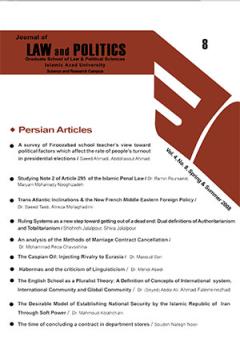Observance of the principle of prohibition of re-trial and re-punishment ( non bis in idem) in proceedings with disciplinary violations of the armed forces; The ideal pattern
Subject Areas : Journal of Law and PoliticsHakime Farnam 1 , Mohamad Ali Mahdavi Sabet 2 , Mohammad Ashouri 3 , علی صفاری 4
1 - PHD student of criminal law and criminology, faculty of theology, law and political science, Tehran Islamic Azad University of Science and Research
2 - Assistant Professor, Department of Criminal Law and Criminology, Faculty of Law, Theology and Political Science , Science and Research Branch , Islamic Azad University , Tehran, Iran .
3 - Professor of the Department of Criminal Law and Criminology, Tehran Azad University of Science and Research
4 - استادیارگروه حقوق جزا و جرمشناسی، دانشکده حقوق، دانشگاه شهید بهشتی، تهران، ایران. (استاد مشاور): alisaffary2020@gmail.com
Keywords: Disciplinary violation, Armed Forces Crimes Punishment Law 1382, Non bis in idem,
Abstract :
Today, there is no opposition regarding the application of the principle of prohibition of re-trial and re-punishment (Non bis in idem) in criminal law. But what is considered novel in order to carry out and apply it in this research is the application of this rule and its extension to administrative and disciplinary violations; Especially when the single act of the perpetrator has the title of crime and violation at the same time. In most of the administrative and disciplinary proceedings in Iran, some of the principles of fair proceedings, especially the principle of prohibition of re-trial and re-punishment, are not only not observed, but if the behavior of the unit has the titles of crimes and violations, it does not have the validity of a sealed criminal order, and for each From the crimes and violations committed, an independent court and administrative court are formed and criminal and administrative trials are conducted. However, the examination of some other laws and regulations, especially the Law on Punishment of Crimes of the Armed Forces approved in 1382, indicates that this principle has been observed, and the legislator, while determining the cases of mere disciplinary violations and removing any ambiguity in their recognition, has left the proceedings to the quasi-criminal commissions. A desirable model that has the capacity to be accepted in other administrative and disciplinary laws and regulations of the country. The study method in this article is analytical-descriptive.


